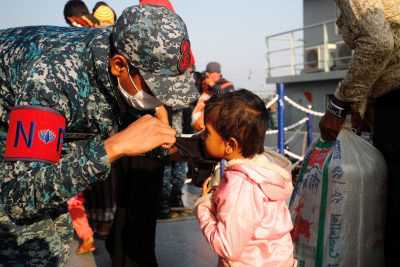COVID-19 ails Bangladesh’s health, politics and economy

Image: Collected
The COVID-19 pandemic was pivotal in shaping the politics and economy of Bangladesh in 2020. The state death count remains less than in various other South Parts of asia. Yet COVID-19 will have long-term wellness, political and economical impacts. It has laid bare the economy’s structural weaknesses and accelerated the growing authoritarianism of the incumbent Bangladesh Awami Little league government. It had been also in conjunction with two different pandemics: persecuting authorities critics and widespread corruption.
Bangladesh’s government underestimated the severe nature of COVID-19 and was ill-well prepared before it hit the united states. As attacks grew, the public health system was overwhelmed and overall health personnel were not receiving adequate support, including personal defensive products. In mid-March, the government was instead focussed on celebrating the centennial of the birth of Sheikh Mujibur Rahman - Bangladesh’s founding president and the father of incumbent Primary Minister Sheikh Hasina.
Years of neglecting the health care system and corruption worsened the problem. COVID-19 testing was kept intentionally low to portray low case numbers. A half-hearted lockdown - described as ‘general getaway’ without clear guidelines - and the lack of a comprehensive health approach aggravated the problem. The government limited access to COVID-19 details by monitoring the press and silencing those speaking up about the hazards of COVID-19, incorporating doctors and nurses. A government-engineered pandemic of persecution ensued. Journalists, human rights activists, college students, teachers and participants of civil society had been arrested and thrown into jail beneath the draconian Digital Security Work.
The government’s initial response to the monetary hardship, especially to low-income households, was focussed on providing subsidised food under the Open Industry Sales social security program. After extreme criticism, it also started a cash-transfer plan. But both had been marred by corruption from ruling get together leaders and native administrators. A third pandemic - among corruption - permeated through the united states. Corruption in the procurement and distribution of medical products, fake COVID-19 tests, substandard masks in hospitals and inflated prices of donor-funded emergency tasks ran rampant.
The government announced 21 stimulus packages equal to 4.3 per cent of GDP to soften the blow from the COVID-19-induced monetary shock. But these failed to reach those who needed it the virtually all, while those linked to the ruling party benefited. Lately November, only 38 % of the stimulus have been disbursed. Further, various ready-built garment (RMG) sector employees complained of not getting their salaries, although owners of the factories had been the beneficiaries of early stimulus packages.
Poverty is estimated to have doubled and vulnerabilities in the middle class have already been exposed. Despite some early on signs of economic recovery due to high volumes of overseas remittances and exports in the RMG sector, the pace has not been as dramatic as the federal government would have hoped.
Bangladesh’s politics remain firmly beneath the control of the ruling get together due to government coercion and the inability of the opposition Bangladesh Nationalist Party to build a movement. Still the federal government faced an uncomfortable situation when a retired armed service official was killed by law enforcement in Bangladesh’s southern district of Teknaf. The extrajudicial killing - allegedly to go over the region’s medication trade and the involvement of the police and native leaders - highlighted the level of extrajudicial killings perpetrated by law enforcement agencies. The government flatly denies this allegation. Between January and September 2020, at least 213 persons have already been victims of extrajudicial killings.
Opposition Bangladesh National Get together Chairperson Khaleda Zia’s sentence was suspended for half a year found in March 2020 on health grounds and extended for another half a year the following September. She actually is currently serving a 17-time sentence on two distinct graft circumstances. The conditional let go allows Zia to become at home but prohibits her from participating in political activities.
By the finish of 2020, conservative Islamists under the leadership of the Hefazat-e-Islam, an Islamist advocacy group, reappeared on the political scene. Islamists compelled the government to react to French President Emmanuel Macron’s responses on press liberty. This was the 1st time in Bangladesh’s record that Islamists dictated a concern of overseas affairs to a seated government. The Islamists’ placement against the building of a sculpture of Sheikh Mujib likewise put the government within an uneasy circumstances. Islamists demanded the removal of all sculptures in the united states and the government’s appeasing stand revealed its reliance on Islamists.
In foreign affairs, Bangladesh’s relations with India - a close ally of today's government - were strained as its relationship with China grew warmer. The much-awaited Teesta water sharing deal with India has even now certainly not been signed although India features been promising it for a long time. Bangladesh requested an nearly US$1 billion mortgage loan for a thorough management and restoration job on the Teesta river and US$16 billion for 26 assignments from China in 2020.
The United States became concerned about the Bangladesh-China relationship and adopted a defence diplomacy policy to enmesh Bangladesh in its Indo-Pacific strategy. A phone from Pakistan’s Primary Minister Imran Khan and Hasina’s ending up in a Pakistani envoy were also indications of a thawing marriage between Bangladesh and Pakistan.
In 2021 Bangladesh’s authorities must give attention to addressing the health challenges of the pandemic alongside issues of governance, particularly the persecution of critics, the imposing of censorship, and controlling widespread corruption. Boosting public healthcare capacity may also be vital to ensuring a successful rollout of any COVID-19 vaccine and spurring an economic recovery.
Source: https://www.eastasiaforum.org
Tags :
Previous Story
- Tea cultivation creates 25,000 jobs in 5 northern...
- Nuclear plant to be a major breakthrough: FM
- Bangladesh takes Tk 2.5bn job to create jobs,...
- 25pc of youth lose jobs
- Inward tour operators slicing jobs
- Modern slavery risk surges for Bangladesh, India RMG...
- Over 95,000 expatriate Bangladeshi employees returned in last...
- A large number of Pakistanis, Bangladeshis leave Oman...